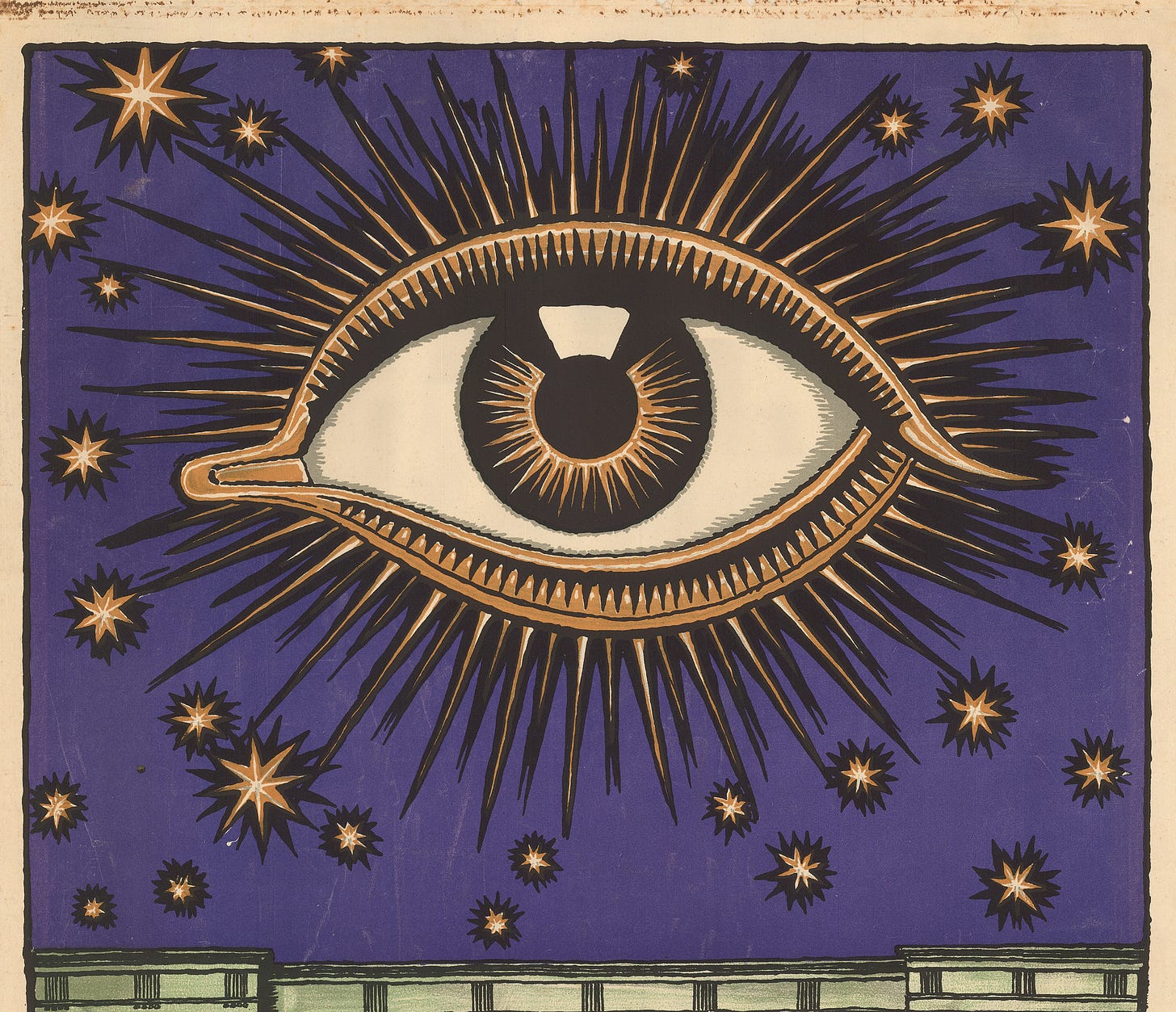
One of the best musicals in the French-speaking world is called Starmania. It was originally written in the late 1970s by a Frenchman, Michel Berger, and a Quebecer, Luc Plamondon. Several of Starmania’s songs have since passed into popular culture on both sides of the Atlantic. I got a chance to go see a production of it last weekend, directed by the guy who also directed the Paris Olympics opening and closing ceremonies. It was easily one of the best shows I’ve ever seen.
As a rock opera, Starmania has, like all operas, a somewhat unrigorous plot. But its themes are surprisingly modern and its impressionistic worldbuilding is intriguing.
It takes place in a vaguely cyberpunk future circa the year 2000, in which the Western World has been unified into a single state. The capital, Monopolis,1 is a model city made of towering skyscrapers, vast suburbs, and a network of underground tunnels in which much of the less privileged parts of society live, sometimes not seeing the sun for months. The most popular entertainment is a TV show called “Starmania,” in which the beautiful host Cristal interviews celebrities, as well as wannabe celebrities — anyone with an interesting life story is welcome to submit a bid to appear on the show and thereby achieve fame. Meanwhile, trouble brews in the suburbs, as a group of young hooligans begins organizing into a real terrorist group called the Black Stars.
In this inegalitarian, sick society that is obsessed with stardom, a man named Zéro Janvier decides to run for President of the Western World. He is a former military man who then became a billionaire real estate tycoon, and is implied to be partly responsible for the unnatural sprawl of Monopolis. Although he wishes he were an artist (probably the most famous song in the musical is him expressing his career regrets), he is now running for the Parti Pris Pour le Progrès (PPPP, meaning something like “Party Decidedly for Progress”) on a platform of building more skyscrapers, developing nuclear power, closing off the Western World to foreigners,2 and restoring order against the threat of the Black Stars. He is suspected of wanting to become a dictator.
In the 1993 production of Starmania, Janvier’s main political opponent is, funnily enough, Bill Clinton. In the 2022-2024 production, as in the original 1979 version, the opposition is instead headed by a literal guru, the Guru Marabout. He3 is an ecological extremist, railing against Janvier’s ambition to build more skyscrapers, destroy nature, and neglect our spiritual betterment.
Though the election is not the primary focus of the plot (that would be the love story between the leader of the terrorists and the Starmania TV host), its arc runs over the entire musical. It provides fuel for many plot events, like the appearance of Stella Spotlight, an aging actress and former sex-symbol who agrees to marry Janvier to help him win. Towards the end of Starmania, the results are announced during an epic disco party at the top of a skyscraper, in a club very unsubtly named “Naziland.” Janvier is elected in a landslide.
Many in the past 45 years have written about the prophetic qualities of Starmania, and in particular the character of Zéro Janvier. The French-language Wikipedia has a page for him. It states that he has been compared to Adolf Hitler (who would have liked to be an artist), Ronald Reagan (an actor who became the most powerful man in the world), Jean-Marie Le Pen (racism), Nicolas Sarkozy (who married a sex-symbol), and of course Donald Trump, for whom the similarities are too many to fit between parentheses:
Real estate mogul, built skyscrapers;
Obsessed with getting media attention;
Married a top model;
Wants to decrease immigration;
Suspected of wanting to be a dictator;
Has a big golden tower in the city.
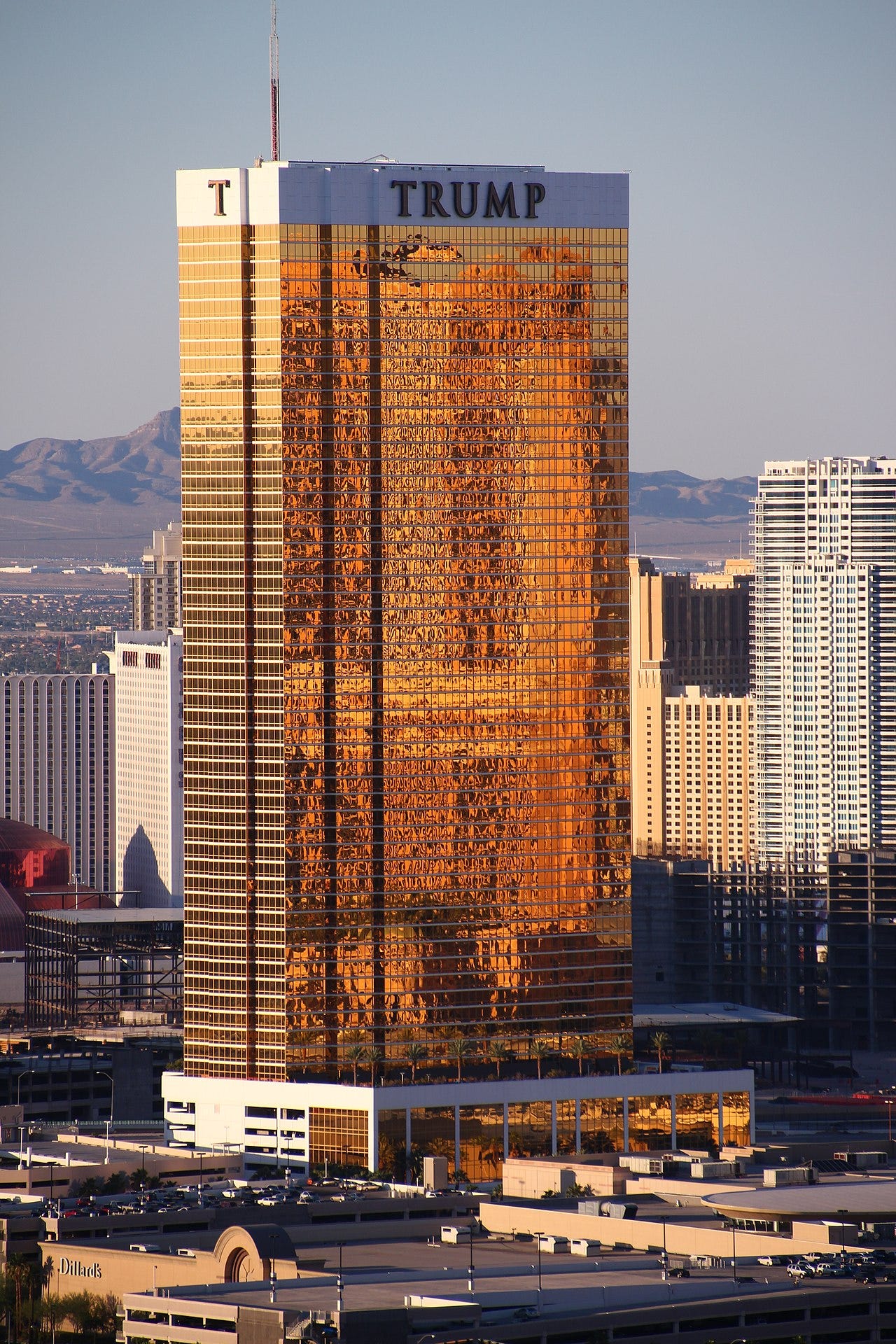
One wonders if Trump saw the show when it was presented in its English version, Tycoon, in Texas in the 1990s (starring Céline Dion, notably), taking it as a model for a life well-lived.
That almost definitely didn’t happen, but if it did, it’s a shame Trump didn’t take inspiration from some other parts of Zéro Janvier’s platform. Because, despite him being the clear villain in the story, I found myself… liking quite a few things in it? His party is decidedly for progress, after all. He wants to build “the new atomic world,” and make man “not be a slave to nature” anymore. So he’s pro-nuclear power, and would probably approvingly read Jason Crawford’s Techno-Humanist Manifesto. He’s also pro-space colonization, (though there’s a dumb line in the lyrics where he says space is his strategy for when the Earth will have become devoid of useful resources). He’s very clearly future-oriented, calling for the West to “leave the past to the nostalgic” and “live the adventure of the future.”
Of course, there’s stuff I don’t like, like the whole anti-immigration shtick — though it has been toned down in the recent production. As for the authoritarianism, I notice that it seems to be an aesthetic and little else: the West in that universe clearly still has free elections, and Janvier makes no statement that he wants to change that. He does take a hard stance against terrorists, but given that they eventually succeed or almost succeed4 at assassinating him (spoiler alert, oops), it seems justified. So Monopolis is depicted as if on the verge of becoming a dystopia, but it isn’t one yet.
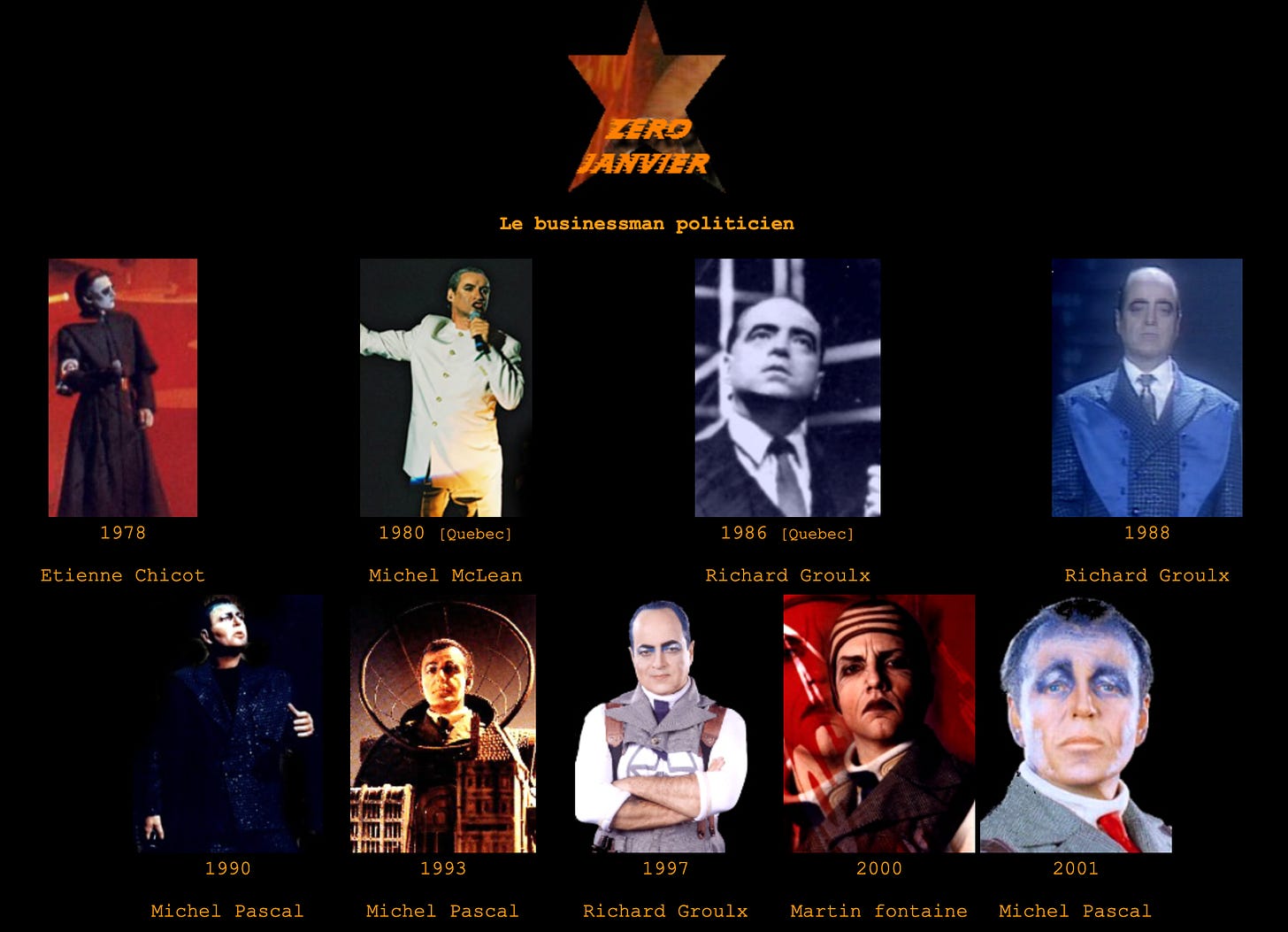
Starmania was written in the 1970s. This is the historical period when things started being weird in the Western World. Although it was clearly a longer trend and I don’t want to pin it down to a single decade,I suspect that the West became rapidly less pro-progress during that time. Economic shocks broke the optimism of the post-war period. Environmentalism became more popular. The space race was won by the US, and soon after it stopped sending people to the moon, because what’s the point. Suddenly, it was less fashionable to want to invest in nuclear power, expand our cities, and talk of colonizing the stars.
I think this is a bad trend, and I can’t say I liked that the pro-progress Zéro Janvier was depicted as a villain. But in this way, too, Starmania was prophetic. It has only become less fashionable, in most parts of society, to want more nuclear power plants, skyscrapers, and space rockets.
But there is an interesting twist, and we have the Guru to thank for that. When he first appeared, spreading his anti-skyscraper and pro-nature message, I was vaguely disappointed: he seemed like a naïve, idealistic good guy, added in just so he could lose to Janvier and add dramatic tension. A bit weird that he looked like a cult leader, but whatever.
Rather unsurprisingly, perhaps, he later turns out to be a literal cult leader. He holds “group therapy” sessions that are actually orgies, complete with psychological manipulation. He openly advocates violence, “a healthy reaction against decadence.” He’s into conspiracy theories, saying that taking medication makes us sick and depressed. He seems to be some kind of degrowther who violently rejects industrial civilization without offering any viable alternative. Here yet again, Starmania is prophetic: degrowth has, sadly, only become more powerful as a movement since then.5
So despite Zéro Janvier being the main antagonist of the show, his political opponent is somehow even worse. No effort is made by Plamondon at making either of them look sympathetic. Both candidates suck. (One wonders how the entire Western World couldn’t come up with anyone better, but then again, for a while, we were heading into a Trump–Biden US presidential match.)
The overall message of Starmania is bleak: the people in power are bad, the rich and famous are depressed under the veneer of their stardom, and the underclass are reduced to working in underground service jobs or expressing their despair by terrorizing the suburbs.
I’m not sure why I like it so much when there’s politics in fiction. I previously saw another version of Starmania in 2008 — it was, uniquely, staged as a classical music opera — and the little I remember of it is the choir singing the slogan “Zéro! Janvier! Président! de l’Occident!”, as well as the announcement of the election results. And in films and novels and video games of all sorts, my ears perk up whenever I see a mention of an election, or a head of government character, or political conflict of any kind.
Part of the answer is that I’m a politics nerds in general. (Though this just kicks the can: Why?) But there’s a bit more to it: I find that politics in a work of fiction is a nice crystallization of the worries of the time it was written. Many other types of conflicts are timeless: love triangles, coping with death, survival against nature, etc. Those are great, and you probably want at least some timeless themes in any story. But it is through politics that the great questions of a period are felt — since politics is by definition the process of figuring out solutions to great collective problems.
Thus the great dystopias of the 20th century all take their inspiration from trends their authors noticed, and construct fictional political machines to illustrate them. In large-scale science fiction like Star Wars, political intrigue makes the world richer, more believable. And in a musical like Starmania, it provides dramatic tension, a sense that important things are happening. Without it, the terrorist attacks and related love story would seem less meaningful.
Fictional politics can, of course, be done poorly. A common trap is to simplify the issues too much, in an ill-fated attempt at making the politics more palatable to those in the audience who don’t care. Then you lose the main benefit: your world isn’t any richer, and can even seem poorer, not well thought out.
As a musical with a bit of a contrived plot, Starmania brushes with this. The two political camps it depicts are simplistic. But they turn out to be good stand-ins for real political trends, progress vs. degrowth, that are still going on decades later, which is a nice achievement in itself. Add in the media and stardom obsession, and the show seems eerily prescient. Not to mention the great music.
We know from the fact that characters reference other cities that Monopolis isn’t New York, Tokyo, Singapore, Rio de Janeiro, or Rotterdam. The underground network is supposedly inspired by Montreal’s, which makes sense given that visiting French people get super excited about Montreal’s underground for some reason. (Montreal’s underground is, in actuality, quite lame.) Presumably, Monopolis isn’t meant to be any existing city, but I still wonder where it could be located.
In earlier versions, he was explicitly racist, calling for the survival of the white race.
The night I saw the show, it was a “he,” and he looked a lot like Raël, but the current production has the role given to a woman half of the nights.
Depending on the version. In the current production, they blow up all of the golden tower’s upper floor and the Naziland club during the election results party, killing most of the characters.
One is reminded of the Unabomber, Ted Taczynski, who began mailing bombs to people involved in technological advancement in 1978, so right around the same time as Starmania was being made, and who published his manifesto in 1995. I think Starmania was ahead by just a tiny bit, since work on it began in 1976-77; by 1978 the album was released.





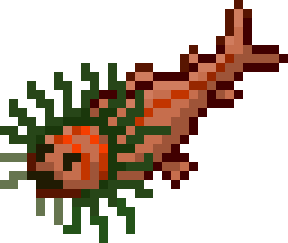
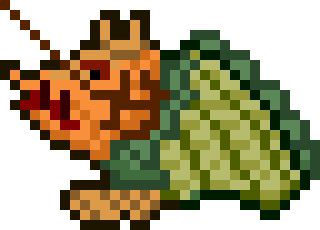
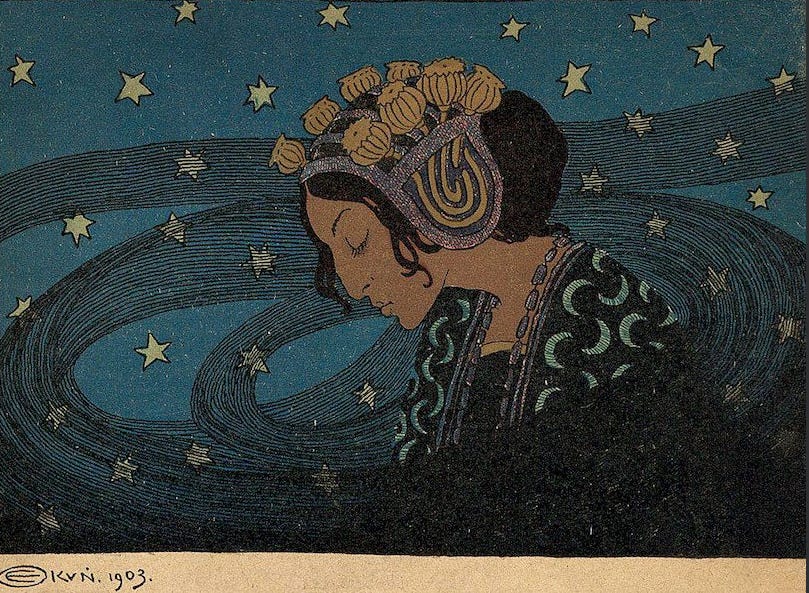
Incidentally Internet Archive has a free copy of the soundtrack if anyone else was interested.
https://archive.org/details/starmania-1979-french-cast-2009-remaster
Hum, la chanson « Ce soir on danse à Naziland » prend tout son sens maintenant. Je me demandais toujours ce que représentait Naziland. Merci de me rapprocher de la culture québécoise!